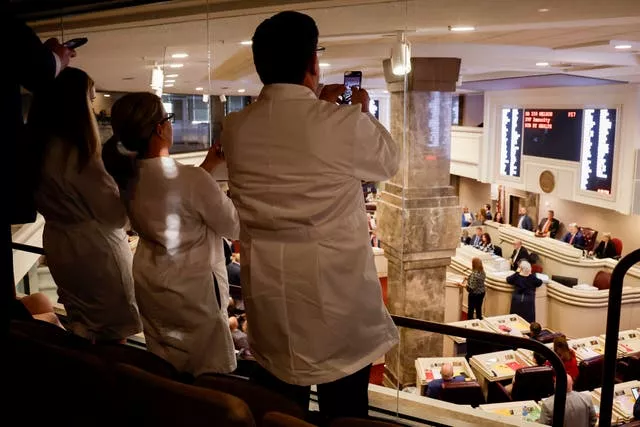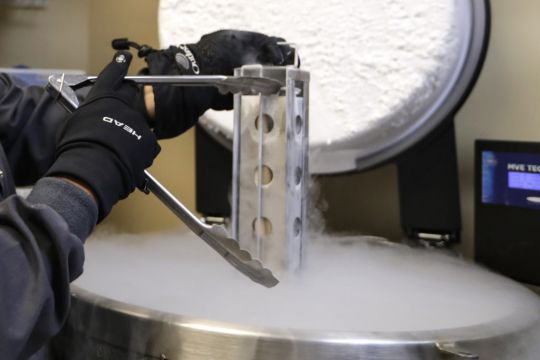Alabama’s governor has signed into law legislation shielding doctors from potential legal liability raised by a court ruling that equated frozen embryos to children.
Republican governor Kay Ivey signed the Bill after it was approved in a late-night session by lawmakers scrambling to address a wave of criticism after services were halted at some of the state’s largest fertility clinics.
Doctors from at least one clinic said they would resume IVF services on Thursday.
“I am pleased to sign this important, short-term measure into law so that couples in Alabama hoping and praying to be parents can grow their families through IVF,” Ms Ivey said.

Republicans in the Republican-dominated Alabama Legislature opted to back the immunity proposal as a solution to the clinics’ concerns. But they shied away from proposals that would address the legal status of embryos created in IVF labs, action that some said would be needed to permanently settle the issue.
The Alabama Supreme Court last month ruled that three couples whose frozen embryos were destroyed in an accident at a storage facility could pursue wrongful death lawsuits for their “extrauterine children”.
The ruling, treating an embryo the same as a child or gestating foetus under the wrongful death statute, raised concerns about civil liabilities for clinics. Three major IVF providers paused services.
The new law, which took effect immediately, shields providers from prosecution and civil lawsuits “for the damage to or death of an embryo” during IVF services. Civil lawsuits could be pursued against manufacturers of IVF-related goods, such as the nutrient-rich solutions used to grow embryos, but damages would be capped to “the price paid for the impacted in vitro cycle”.
Patients and doctors had travelled to Montgomery, to urge lawmakers to find a solution. They described appointments that were abruptly cancelled and how their paths to parenthood had been suddenly put in doubt.
Doctors from Alabama Fertility, one of the clinics that paused IVF services, watched as the Bill got final passage. They said it would allow them to resume embryo transfers “starting tomorrow”.
“We have some transfers tomorrow and some Friday. This means that we will be able to do embryo transfers and hopefully have more pregnancies and babies in the state of Alabama,” Dr Mamie McLean said after the vote.
The University of Alabama at Birmingham said it was also “moving to promptly resume IVF treatments”.
Republican senator Larry Stutts, an obstetrician who cast the single no vote in the Senate, said the Bill was an “IVF provider and supplier protection Bill” and did not protect patients.

“It is actually limiting the ability of mothers who are involved in IVF to have recourse and it is placing a dollar value on human life,” Mr Stutts said.
House Democrats proposed legislation stating that a human embryo outside a uterus could not be considered an unborn child or human being under state law. Democrats argued that was the most direct way to deal with the issue. Republicans did not bring the proposal up for a vote.
State Republicans are reckoning with a crisis they partly helped create with anti-abortion language added to the Alabama constitution in 2018. The amendment, which was approved by 59% of voters, said it was state policy to recognise the “rights of unborn children”.
The phrase became the basis of the court’s ruling.







